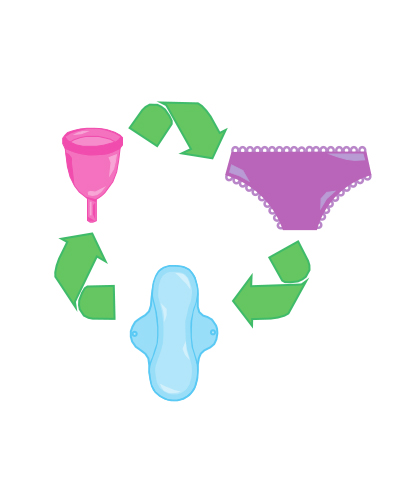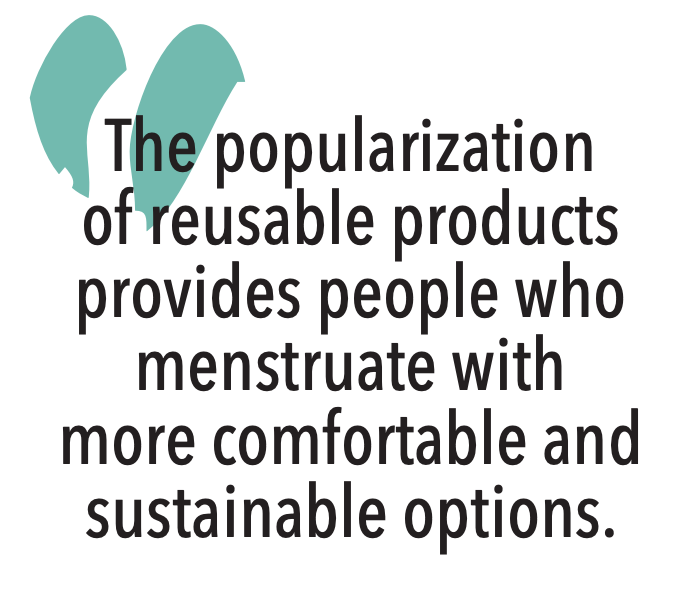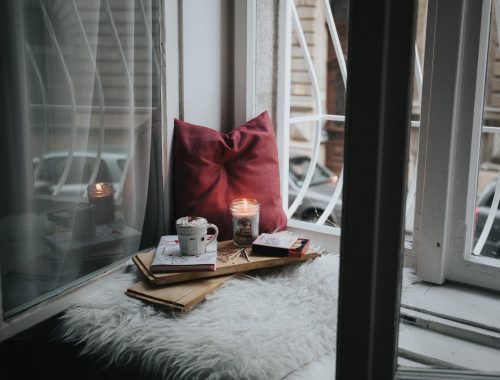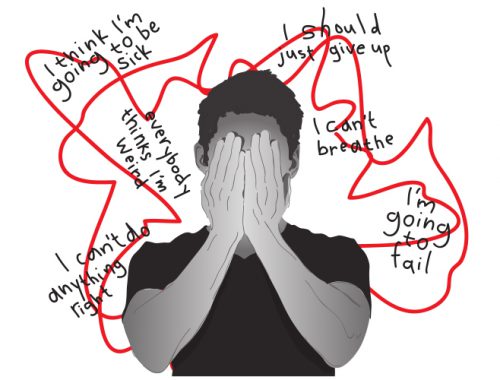
They’re Reusable. Period.
Stores are stocking the shelves with more sustainable menstruation products.
Pads and tampons are sold at every grocery store and pharmacy in the U.S., as well as online. And for the last century, these disposable period products have been the norm. However, the popularization of reusable products provides people who menstruate with more comfortable and sustainable options.
Pads and tampons are not cheap, and they can be uncomfortable, but more choices are flooding the market. Eco-friendly products such as menstrual cups, reusable pads and period-proof underwear are changing the way people think about and care for their cycle.
Reusable pads cost about the same as a box of traditional, disposable pads on Amazon—around $10 to $15. Unlike disposable pads, reusable ones aren’t thrown in the trash after use. Instead, they’re tossed in the washing machine before the next wear.
Molly-Margaret Johnson, 26, is the person behind the Instagram account @whatswrongwithmyvagina, a platform for women, transgender, non-binary people and their allies to discuss “anything sex and body related.” Johnson covers topics such as safe sex, casual dating, intimacy, vaginal health and periods.
Washable and reusable period products are featured on Johnson’s page, as she started wearing period-proof underwear and washable pads around a year ago. She says she was constantly on her period and the use of disposable pads began to irritate her vulva. “My body doesn’t react well to tampons or cups, or any menstrual product that you put inside you, so basically the only other option was a reusable pad,” she says.
Johnson says switching to reusable pads “totally solved the problem [of irritation] overnight.” And unlike disposable pads, she virtually never has to change them during the day. She adds that reusable pads and period-proof underwear have no “ick factor,” and that she doesn’t feel gross or “swampy” when wearing them. Moreover, these products are genuinely reusable. Johnson says the products she uses both wash and wear well, period after period. In addition to reusable pads, Johnson also relies on period-proof underwear, like those of the brand Thinx.
Emma Pringnitz, a senior studying psychology at the University of Minnesota, has used Thinx for three years. Pringnitz, who has endometriosis (a condition involving uterus tissue), says she has “really heavy and uncomfortable periods.”

She started wearing the period-proof underwear to prevent bleeding through her clothing and to be more comfortable overall during her cycle.
Although Pringnitz initially found it difficult to justify purchasing Thinx, she says she is grateful to have made the jump because she almost never purchases period products now. A pair of Thinx Hiphuggers cost $34, and absorb two regular tampons’ worth of blood, while simultaneously controlling odor and preventing leaks.
Haley Hauptman, 21, started using a menstrual cup last year because she says it felt like a “better option” for her period. Hauptman, also a student at the U of M, noticed she was changing her tampons more than she wanted to. “I’d change it and there wouldn’t be a lot of blood in it, and I’d feel like I’m wasting it or I’d just be paranoid, like the whole day.”
Hauptman says her worries have ceased since using a menstrual cup. Although her switch from tampons to the cup originated in convenience, Hauptman says sustainability is now at the “forefront” of why she uses a cup.
“I’m doing something good for my body, for the environment and my wallet,” she says.
Pringnitz and Hauptman also advocate for menstrual equality and sustainable menstruation practices via their student group, Period.MN. The students of Period.MN work to destigmatize menstruation and provide period products to local communities in need. Additionally, they work to educate people who menstruate on sustainable period products, including hosting a “cup and cloth” workshop, where people can learn about reusable products and take home their own.
Johnson suggests that if someone is hesitant to try reusable period products, they should give them a shot, citing affordability. “There is an affordable version of all of them [reusable period products].”
Hauptman also says while reusable period products may work for some people, these products may not be the right choice for everyone, as peoples’ experiences and relationships with their period are unique to the person who menstruates.
The products people use on their period are important. Periods can bring discomfort, but Johnson, Pringnitz and Hauptman say that reusable products make their periods easier.
For many people, changing to washable or reusable period products has transformed their relationship with their period for the better. Hauptman says that using a cup has allowed her to think about her period in a “much more positive way.”
“[Menstruation] affects us every day, physically, mentally and sexually,” Johnson says. “It feels good to use a product that literally feels nice.”










